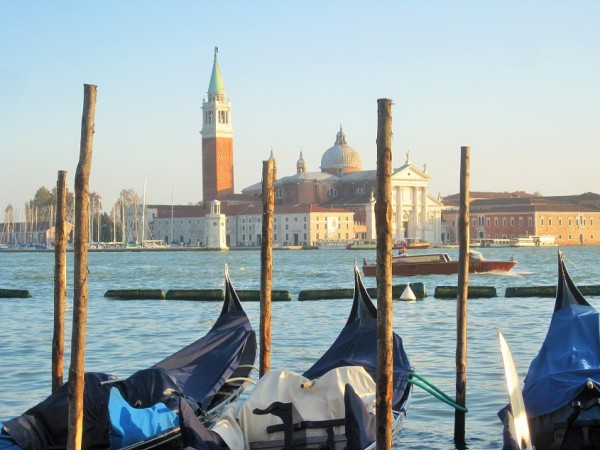Everything you’ve heard about Venice is true.
The endless winding alleyways, the beautifully blue canals – and the impossible amounts of tourists (even in November) – yet it’s still an incredible place to visit.
Venice was my first foray into Italy. Having spent a long time studying Central and Eastern Europe, I missed visiting the more ‘classic’ sites of Western Europe – it wasn’t until a friend of mine moved to Venice that the city even appeared on my radar, but I am certainly glad it did.
The tide is high
Arriving at Venice during acqua alta was incredible. There was water everywhere. People were scrambling for wellies and the shoe shops were packed. Eventually, we paid €20 each for some less-than-waterproof boots, only for the water to drain away thirty minutes later. Still – it was a pretty amazing experience. After that, the weather cleared up and it was bright and sunny for the rest of the weekend.
For more photos, click here.
When in Venice
We then did the mandatory boat trip along the Grand Canal, which was excellent. The city really needs to be seen to be believed, and there’s no better way than by boat. Gondolas are horrifically expensive so we stuck to the water taxis. Another must is simply getting lost down the countless alleyways. A cliché, but no less true, there is some stunning architecture in Venice – the majority of which we stumbled upon by chance.
Over the weekend we did the usual tourist things: we queued for the basilica, we queued for the campanile, we visited the church of San Giorgio Maggiore and waited for the sunset – all of which was brilliant. As 1st November is All Saints Day, we also headed over to Cemetery Island for an afternoon. Though probably not on many must-see lists, the island is lovely for a stroll.
However, my favourite thing was possibly the Jewish quarter and the Jewish Museum of Venice tour. Venice has a very interesting place in Jewish history – the word ‘ghetto’ is derived from the Venetian word ‘gheto’, and was the name given for the area where the Venetian Jews lived. For a long time, the Jewish population was only allowed the leave their area of the city during working hours. Though the museum itself is a little dull, the tour takes you around three synagogues, which are completely hidden from the square.
Top tip: don’t forget to give your kippah back at the end of the tour – I unknowingly had mine on for a good half hour afterwards as we strolled around Venice. It wasn’t until a waiter assured me they served non-Pork dishes that we twigged…
Mestre
Mestre is the mainland city across the bridge from Venice. Though the place itself is pretty uninspiring and has a thriving prostitute population, it’s a lot cheaper to stay and eat here if you can. The town centre has a good selection of bars and restaurants.
Food & drink
The food in Venice is excellent, but expensive. Luckily, the wine is not, but in Venice the local drink is Spritz. A sweet sparkling processo cocktail, it’s normally served with crisps and you can find it everywhere. However, don’t be surprised if you’re served an espresso when you ask for a spritz – it happened to us more than once. Must be the accent.
The people
Venice is a popular city. Even in November, the place was full of tourists – the smaller alleyways near the grand canal were thronging and we queued for over half an hour for the basilica and the campanile. Though I’ve never been in summer, I have to assume the place would be hellish.
As an actual city, Venice is fairly interesting. Its main purpose seems to be tourism or textiles, and the place is fairly small. We were told it’s very rare for more than two generations of a family to stay in Venice – people are constantly moving away or moving there for the textiles business. It certainly seems like a difficult place to live in – every old woman who went to hang her washing out was photographed by about twenty different people.
Nevertheless, the place is absolutely beautiful – one of the most beautiful cities I’ve visited, and is definitely worth a trip – whether you can stand the tourists or not.

